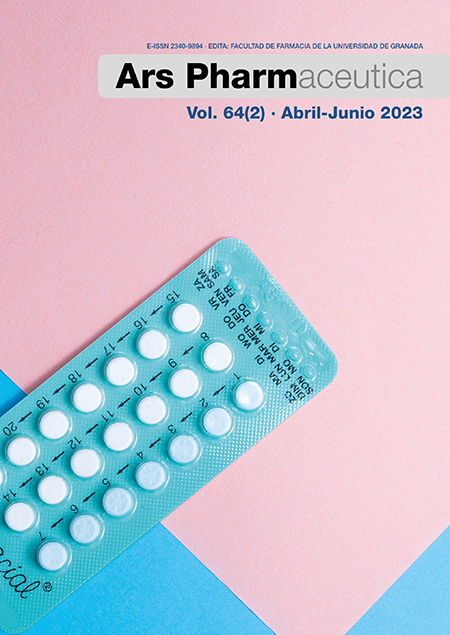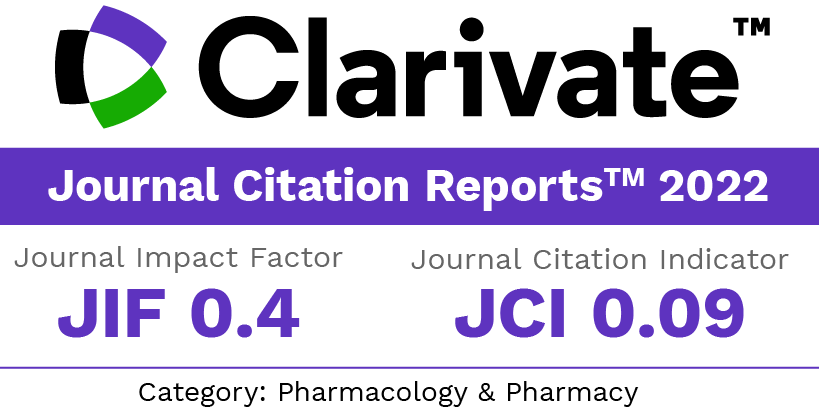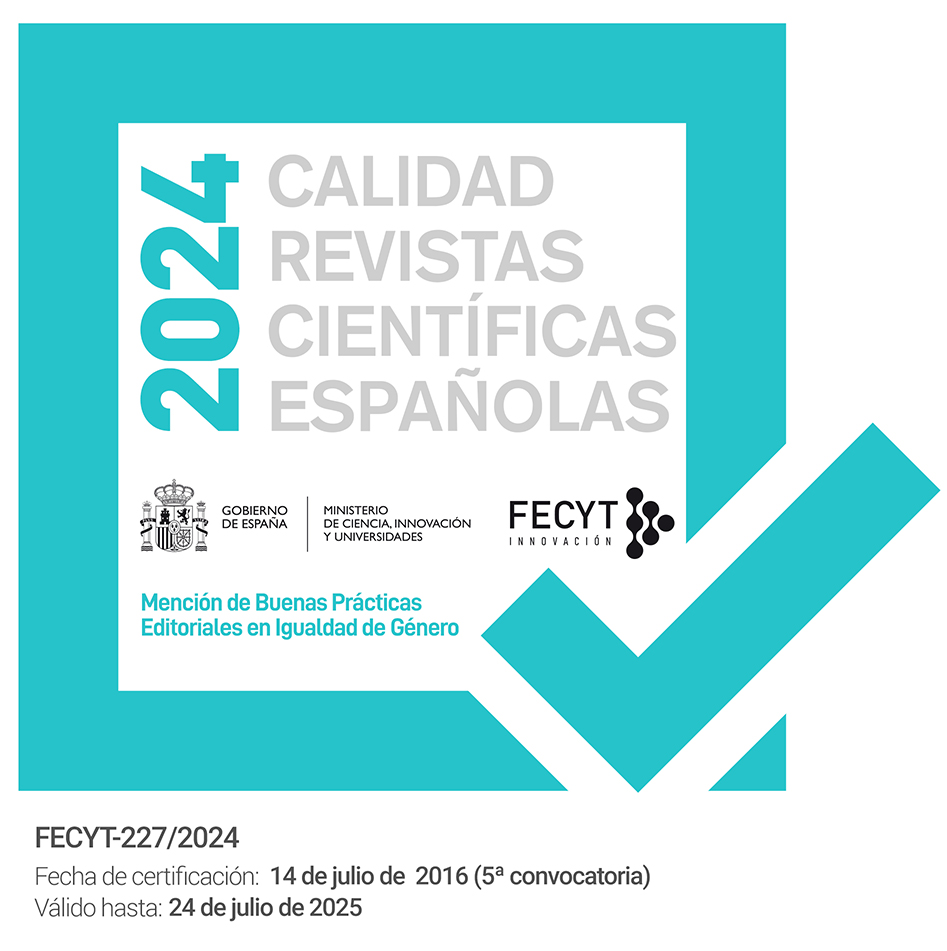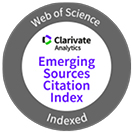Cuestionarios de adherencia al tratamiento antidiabético oral en pacientes con Diabetes Mellitus 2: revisión sistemática
DOI:
https://doi.org/10.30827/ars.v64i2.27256Palabras clave:
Diabetes Mellitus tipo 2; Adherencia a la Medicación; Hipoglucemiantes; Encuestas y Cuestionarios; Reproducibilidad de los Resultados.Resumen
Introducción: La adherencia a los antidiabéticos orales (ADOs) en pacientes con Diabetes Mellitus tipo 2 (DM2) puede afectar al control de la enfermedad y por tanto, es necesario evaluarla. Para ello se necesitan herramientas rápidas, sencillas, válidas y fiables. De manera que el objetivo de esta revisión fue identificar aquellos cuestionarios validados que se usan para medir la adherencia a los ADOs en la práctica clínica.
Método: se llevó a cabo una búsqueda bibliográfica en las bases de datos Medline, Scopus y LILACS. La selección de artículos la realizaron dos autores de manera independiente en base a las recomendaciones Prisma. Los criterios de selección fueron: artículos con cuestionarios validados en pacientes con DM2, en español o inglés y publicados hasta el 31 de noviembre de 2022.Se resumieron las pruebas de fiabilidad (consistencia interna, correlación ítem- total, coeficiente de correlación intraclase) y validez de los cuestionarios (validez de constructo, de criterio y de contenido).
Resultados: 23 artículos formaron parte de la revisión. Se obtuvieron 10 cuestionarios de medida de la adherencia a los ADOs los cuales fueron validados en 14 países. El 8-item Self-Reported Medication Adherence Measure (MMAS-8) y el Adherence to Refills and Medications Scale (ARMS) fueron los más usados. Todos presentaron al menos una medida de validez y fiabilidad, siendo la validez de grupos conocidos la menos empleada.
Conclusiones: Hay cuestionarios que presentan datos de validez o fiabilidad mejores que otros, pero deberá ser el profesional sanitario quien determine cuál se ajusta mejor a sus pacientes o a su estudio.
Descargas
Citas
International Diabetes Federation (IDF) Diabetes Atlas. 10th edition.[monografía en internet]. International Diabetes Federation; 2021[citado 20 de diciembre de 2022] disponible en: https://fmdiabetes.org/wp-content/uploads/2022/01/IDF_Atlas_10th_Edition_2021-comprimido.pdf
Soriguer F, Goday A, Bosch-Comas A, et al. Prevalence of diabetes mellitus and impaired glucose regulation in Spain: the Di@bet.es Study. Diabetologia. 2012; 55(1):88-93. doi: 10.1007/s00125-011-2336-9. DOI: https://doi.org/10.1007/s00125-011-2336-9
Rojo-Martínez G, Valdés S, Soriguer F, et al. Incidence of diabetes mellitus in Spain as results of the nation-wide cohort di@bet.es study. Sci Rep. 2020; 10(1):2765. doi: 10.1038/s41598-020-59643-7. DOI: https://doi.org/10.1038/s41598-020-59643-7
Ministerio de Sanidad - Portal Estadístico del SNS - Informe anual del Sistema Nacional de Salud [Internet]. [citado 13 de noviembre de 2022]. Disponible en: https://www.sanidad.gob.es/estadEstudios/estadisticas/sisInfSanSNS/tablasEstadisticas/InfAnSNS.htm
Guía ESC 2019 sobre diabetes, prediabetes y enfermedad cardiovascular, en colaboración con la European Association for the Study of Diabetes (EASD) [Internet]. [citado 13 de noviembre de 2022]. Disponible en: https://www.revespcardiol.org/es-pdf-S0300893220300889.
Egede LE, Gebregziabher M, Echols C, Lynch CP. Longitudinal effects of medication nonadherence on glycemic control. Ann Pharmacother. 2014; 48(5):562-70.doi: 10.1177/1060028014526362. DOI: https://doi.org/10.1177/1060028014526362
Iglay K, Cartier SE, Rosen VM, et al. Meta-analysis of studies examining medication adherence, persistence, and discontinuation of oral antihyperglycemic agents in type 2 diabetes. Curr Med Res Opin. 2015; 31(7):1283-1296. doi:10.1185/03007995.2015.1053048. DOI: https://doi.org/10.1185/03007995.2015.1053048
Moreno Juste A, Gimeno Miguel A, Poblador Plou B, et al. Adherence to treatment of hypertension, hypercholesterolaemia and diabetes in an elderly population of a Spanish cohort. Med Clin (Barc). 2019; 153(1):1-5. doi:10.1016/j.medcli.2018.10.023. DOI: https://doi.org/10.1016/j.medcle.2018.10.026
Pagès-Puigdemont N, Valverde-Merino MI. Métodos para medir la adherencia terapéutica. Ars Pharm. 2018; 59(3):163-172. doi:10.30827/ars.v59i3.7387. DOI: https://doi.org/10.30827/ars.v59i3.7387
Page MJ, McKenzie JE, Bossuyt PM, et al. The PRISMA 2020 statement: An updated guideline for reporting systematic reviews. J Clin Epidemiol. 2021; 134:178-189. doi: 10.1016/j.jclinepi.2021.03.001. DOI: https://doi.org/10.1016/j.jclinepi.2021.02.003
Sakthong P, Chabunthom R, Charoenvisuthiwongs R. Psychometric properties of the Thai version of the 8-item Morisky Medication Adherence Scale in patients with type 2 diabetes. Ann Pharmacother. 2009; 43(5):950-957. doi:10.1345/aph.1L453. DOI: https://doi.org/10.1345/aph.1L453
Al-Qazaz HK, Hassali MA, Shafie AA, Sulaiman SA, Sundram S, Morisky DE. The eight-item Morisky Medication Adherence Scale MMAS: Translation and validation of the Malaysian version. Diabetes Res Clin Pract. 2010; 90(2):216-221. doi:10.1016/j.diabres.2010.08.012. DOI: https://doi.org/10.1016/j.diabres.2010.08.012
Lee WY, Ahn J, Kim JH, et al. Reliability and validity of a self-reported measure of medication adherence in patients with type 2 diabetes mellitus in Korea. J Int Med Res. 2013; 41(4):1098-1110. doi:10.1177/0300060513484433. DOI: https://doi.org/10.1177/0300060513484433
Tandon S, Chew M, Eklu-Gadegbeku CK, Shermock KM, Morisky DE. Validation and psychometric properties of the 8-item Morisky Medication Adherence Scale (MMAS-8) in Type 2 diabetes patients in sub-Saharan Africa. Diabetes Res Clin Pract. 2015; 110(2):129-136. doi:10.1016/j.diabres.2015.10.001. DOI: https://doi.org/10.1016/j.diabres.2015.10.001
Ashur ST, Shamsuddin K, Shah SA, Bosseri S, Morisky DE. Reliability and known-group validity of the Arabic version of the 8-item Morisky Medication Adherence Scale among type 2 diabetes mellitus patients. East Mediterr Health J. 2015; 21(10):722-728. doi:10.26719/2015.21.10.722. DOI: https://doi.org/10.26719/2015.21.10.722
Martinez-Perez P, Orozco-Beltrán D, Pomares-Gomez F, et al. Validation and psychometric properties of the 8-item Morisky Medication Adherence Scale (MMAS-8) in type 2 diabetes patients in Spain. Aten Prim. 2021; 53(2):101942. doi: 10.1016/j.aprim.2020.09.007. DOI: https://doi.org/10.1016/j.aprim.2020.09.007
Kripalani S, Risser J, Gatti ME, Jacobson TA. Development and evaluation of the Adherence to Refills and Medications Scale (ARMS) among low-literacy patients with chronic disease. Value Health. 2009; 12(1):118-123. doi: 10.1111/j.1524-4733.2008.00400.x. DOI: https://doi.org/10.1111/j.1524-4733.2008.00400.x
Mayberry LS, Gonzalez JS, Wallston KA, Kripalani S, Osborn CY. The ARMS-D out performs the SDSCA, but both are reliable, valid, and predict glycemic control. Diabetes Res Clin Pract. 2013; 102(2):96-104.doi: 10.1016/j.diabres.2013.09.010. DOI: https://doi.org/10.1016/j.diabres.2013.09.010
Kim CJ, Park E, Schlenk EA, Kim M, Kim DJ. Psychometric Evaluation of a Korean Version of the Adherence to Refills and Medications Scale (ARMS) in Adults With Type 2 Diabetes. Diabetes Educ. 2016; 42(2):188-198. doi:10.1177/0145721716632062. DOI: https://doi.org/10.1177/0145721716632062
Gökdoğan F, Kes D. Validity and reliability of the Turkish Adherence to Refills and Medications Scale. Int. J. Nurs. Pract. 2017; 23(5):e12566. doi: 10.1111/ijn.12566. DOI: https://doi.org/10.1111/ijn.12566
Alammari G, Alhazzani H, AlRajhi N, et al. Validation of an Arabic Version of the Adherence to Refills and Medications Scale (ARMS). Healthcare. 2021; 9(11):1430. doi: 10.3390/healthcare9111430. DOI: https://doi.org/10.3390/healthcare9111430
Urzúa M A, Cabrera R C, González V C, et al. Psychometric properties of the diabetes mellitus 2 treatment adherence scale version III (EATDM-III) adapted for Chilean patients. Rev Med Chile. 2015; 143(6):733-743. doi:10.4067/S0034-98872015000600006. DOI: https://doi.org/10.4067/S0034-98872015000600006
Demirtaş A, Akbayrak N. Development of an assessment scale for treatment compliance in type 2 Diabetes Mellitus in Turkish population: Psychometric evaluation. Int J Nurs Sci. 2017; 4(3):244-251. doi:10.1016/j.ijnss.2017.06.002 DOI: https://doi.org/10.1016/j.ijnss.2017.06.002
Chung WW, Chua SS, Lai PSM, Morisky DE. The Malaysian Medication Adherence Scale (MALMAS): Concurrent Validity Using a Clinical Measure among People with Type 2 Diabetes in Malaysia. PLoS One. 2015; 10(4):e0124275. doi:10.1371/journal.pone.0124275. DOI: https://doi.org/10.1371/journal.pone.0124275
Lai PSM, Sellappans R, Chua SS. Reliability and Validity of the M-MALMAS Instrument to Assess Medication Adherence in Malay-Speaking Patients with Type 2 Diabetes. Pharmaceut Med. 2020; 34(3):201-207. doi:10.1007/s40290-020-00335-y. DOI: https://doi.org/10.1007/s40290-020-00335-y
Wang Y, Lee J, Toh MPHS, Tang WE, Ko Y. Validity and reliability of a self-reported measure of medication adherence in patients with Type 2 diabetes mellitus in Singapore. Diabet Med. 2012; 29(9):e338-344. doi:10.1111/j.1464-5491.2012.03733.x. DOI: https://doi.org/10.1111/j.1464-5491.2012.03733.x
Momirovic A, Ganza M, Culig B, Leppee M, Prga I. Psychometric properties of the Culig’s questionnaire. Psychiatr Danub. 2016; 28 Suppl 2:234-241.
Ayoub D, Mroueh L, El-Hajj M, et al. Evaluation of antidiabetic medication adherence in the Lebanese population: development of the Lebanese Diabetes Medication Adherence Scale. Int J Pharm Pract. 2019; 27(5):468-476. DOI: https://doi.org/10.1111/ijpp.12558
Boas LCGV, Lima MLSAP de, Pace AE. Adherence to treatment for diabetes mellitus: validation of instruments for oral antidiabetics and insulin. Rev Lat Am Enfermagem. 2014; 22(1):11-18.doi:10.1590/0104-1169.3155.2386. DOI: https://doi.org/10.1590/0104-1169.3155.2386
Díaz Romero RM, Mendoza Flores ME, Belmont Padilla J. Validación de un instrumento para evaluar la adherencia terapéutica en diabéticas durante el embarazo. Perinatol reprod hum. 2004; 217-224.
Prado-Aguilar CA, Martínez YV, Segovia-Bernal Y, Reyes-Martínez R, Arias-Ulloa R. Performance of two questionnaires to measure treatment adherence in patients with Type-2 diabetes. BMC Public Health. 2009; 9: 38.doi: 10.1186/1471-2458-9-38. DOI: https://doi.org/10.1186/1471-2458-9-38
Strainer D, Norman G, Cairney J. Health measurement scales. A practical guide to their development and use.5th ed. Oxford. 2015. DOI: https://doi.org/10.1093/med/9780199685219.001.0001
Carvajal A, Centeno C, Watson R, Martinez M, Rubiales AS. ¿Cómo validar un instrumento de medida de la salud? Anales del Sistema Sanitario de Navarra [Internet]. 2011 [citado 15 de diciembre de 2022]; 34(1). Disponible en: https://recyt.fecyt.es/index.php/ASSN/article/view/10317. DOI: https://doi.org/10.4321/S1137-66272011000100007
Lamprea JAM, Gómez-Restrepo C. Validez en la evaluación de escalas. Revista Colombiana de Psiquiatría. 2007; 36(2):340.
Morisky DE, Ang A, Krousel-Wood M, Ward HJ. Predictive validity of a medication adherence measure in an outpatient setting. J Clin Hypertens (Greenwich). 2008; 10(5):348-354. doi:10.1111/j.1751-7176.2008.07572.x. DOI: https://doi.org/10.1111/j.1751-7176.2008.07572.x
Mallah Z, Hammoud Y, Awada S, et al. Validation of diabetes medication adherence scale in the Lebanese population. Diabetes Res Clin Pract. 2019; 156.doi:10.1016/j.diabres.2019.107837. DOI: https://doi.org/10.1016/j.diabres.2019.107837
Hatah E, Rahim N, Makmor-Bakry M, et al. Development and validation of Malaysia Medication Adherence Assessment Tool (MyMAAT) for diabetic patients. PLoS One. 2020; 15(11):e0241909. doi:10.1371/journal.pone.0241909. DOI: https://doi.org/10.1371/journal.pone.0241909
Lu Y, Xu J, Zhao W, Han HR. Measuring Self-Care in Persons With Type 2 Diabetes: A Systematic Review. Eval Health Prof. 2016; 39(2):131-184. doi:10.1177/0163278715588927. DOI: https://doi.org/10.1177/0163278715588927
Moon SJ, Lee WY, Hwang JS, Hong YP, Morisky DE. Accuracy of a screening tool for medication adherence: A systematic review and meta-analysis of the Morisky Medication Adherence Scale-8. PLoS One. 2017; 12(11):e0187139. doi: 10.1371/journal.pone.0187139. DOI: https://doi.org/10.1371/journal.pone.0187139
Publicado
Cómo citar
Número
Sección
Licencia
Derechos de autor 2023 Elisabet Esquivel-Prados

Esta obra está bajo una licencia internacional Creative Commons Atribución-NoComercial-CompartirIgual 4.0.
Los artículos que se publican en esta revista están sujetos a los siguientes términos en relación a los derechos patrimoniales o de explotación:
- Los autores/as conservarán sus derechos de autor y garantizarán a la revista el derecho de primera publicación de su obra, la cual se distribuirá con una licencia Creative Commons BY-NC-SA 4.0 que permite a terceros reutilizar la obra siempre que se indique su autor, se cite la fuente original y no se haga un uso comercial de la misma.
- Los autores/as podrán adoptar otros acuerdos de licencia no exclusiva de distribución de la versión de la obra publicada (p. ej.: depositarla en un archivo telemático institucional o publicarla en un volumen monográfico) siempre que se indique la fuente original de su publicación.
- Se permite y recomienda a los autores/as difundir su obra a través de Internet (p. ej.: en repositorios institucionales o en su página web) antes y durante el proceso de envío, lo cual puede producir intercambios interesantes y aumentar las citas de la obra publicada. (Véase El efecto del acceso abierto).
























